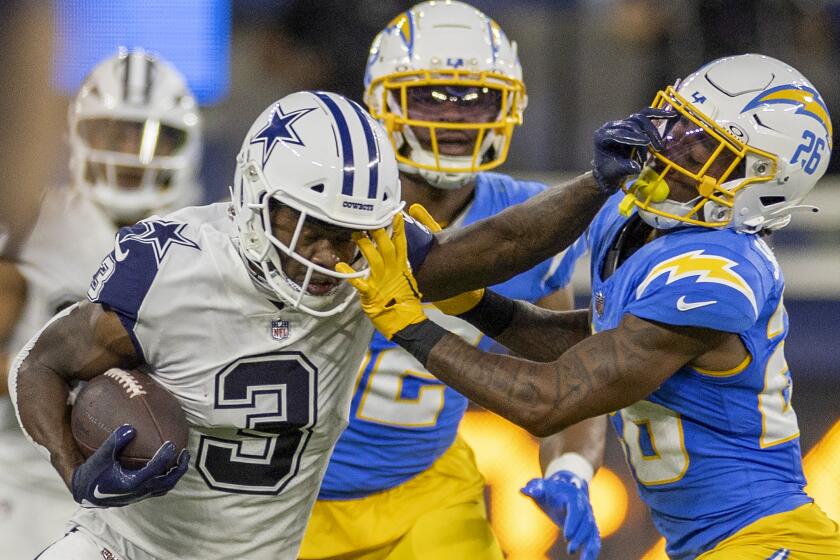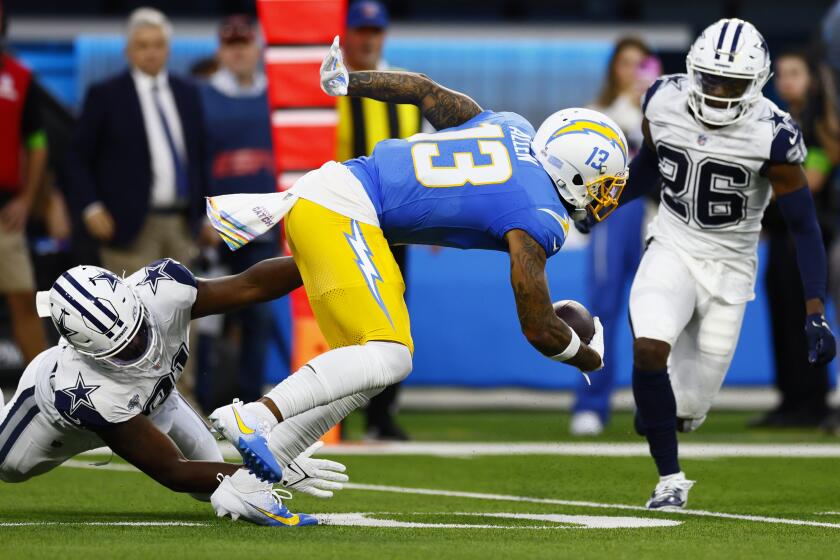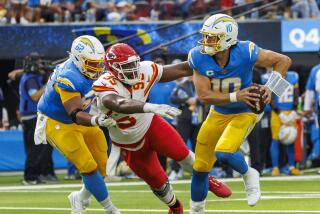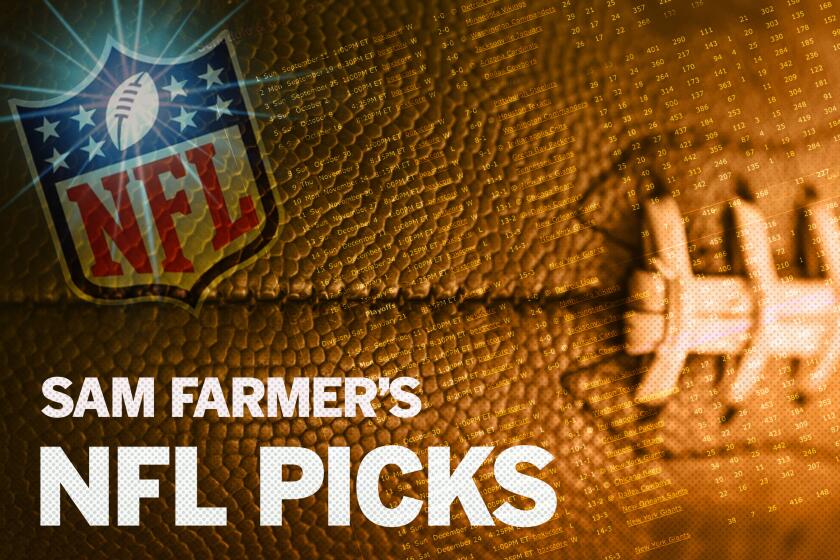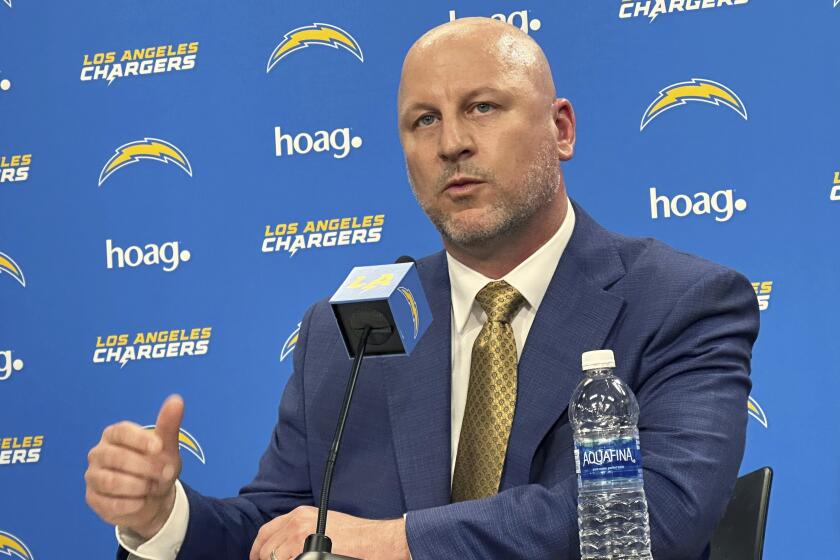Column: Blame galore in Chargers loss to Dallas, but Justin Herbert is the guy paid to rescue wins
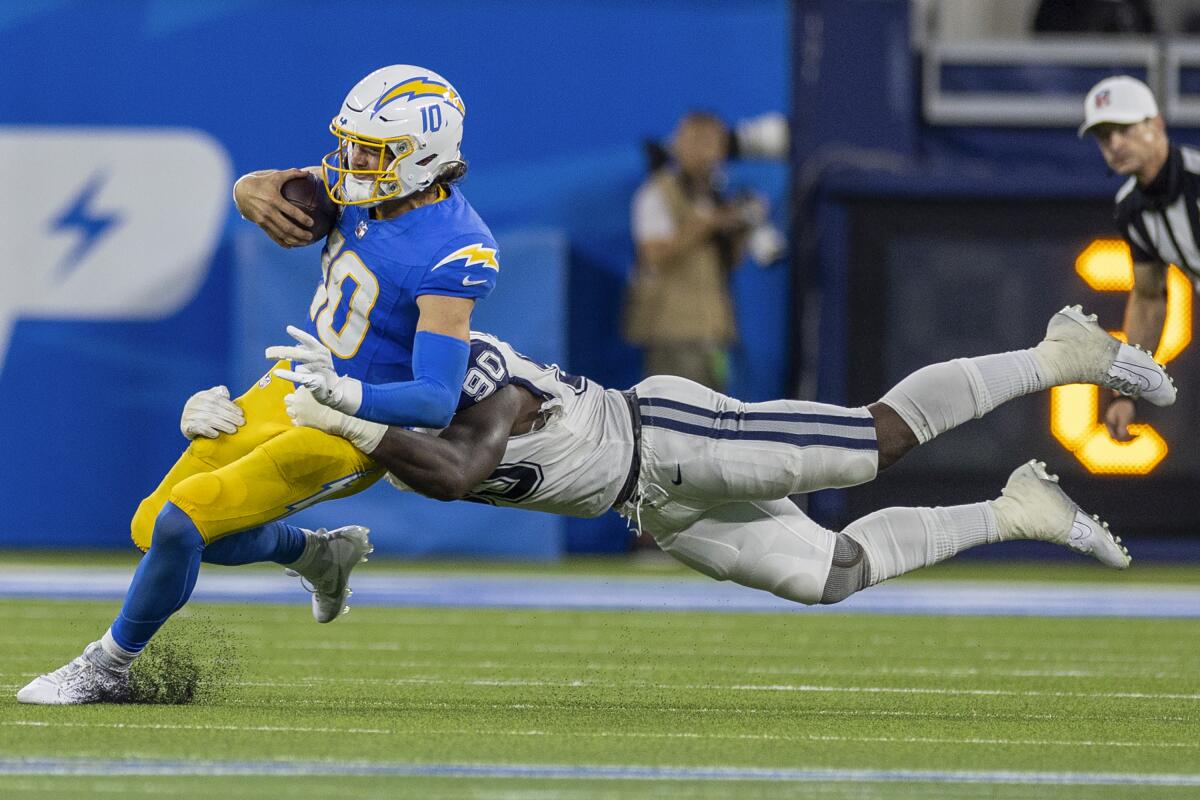
The Chargers have an offensive-ground-game problem. They have a defensive-third-down problem. Now, they also have a Justin Herbert problem.
Herbert might not be the reason why the Chargers were defeated on Monday night, but he couldn’t make himself the reason they won either.
And that’s a problem.
The Chargers made a record investment in him before the season because they believed he could make the kinds of throws he missed in a 20-17 loss to the Dallas Cowboys.
They signed him to a contract extension worth as much as $262.5 million. because they believed he could win the kind of game they lost at SoFi Stadium.
The Chargers had a chance in the fourth quarter against Dallas, but allowed a field goal before Justin Herbert had a pass intercepted on a last-gasp drive.
They guaranteed him more than half that amount because they believed he could be the kind of quarterback who could make up for the team’s shortcomings.
Herbert isn’t delivering, and the Chargers have a 2-3 record with a visit to Kansas City coming up next.
“I gotta make more plays at quarterback,” said Herbert, who played with a fractured middle finger on his non-throwing left hand.
The Chargers were down by a field goal against the Cowboys when they started their final drive on their 25 with 2 minutes 19 seconds on the clock.
Forget about Herbert leading the Chargers into Cowboys’ territory. Forget about Herbert setting up a field goal to force overtime and throwing for a go-ahead touchdown. Herbert couldn’t even get a first down, his last hurried throw intercepted by cornerback Stephon Gilmore.
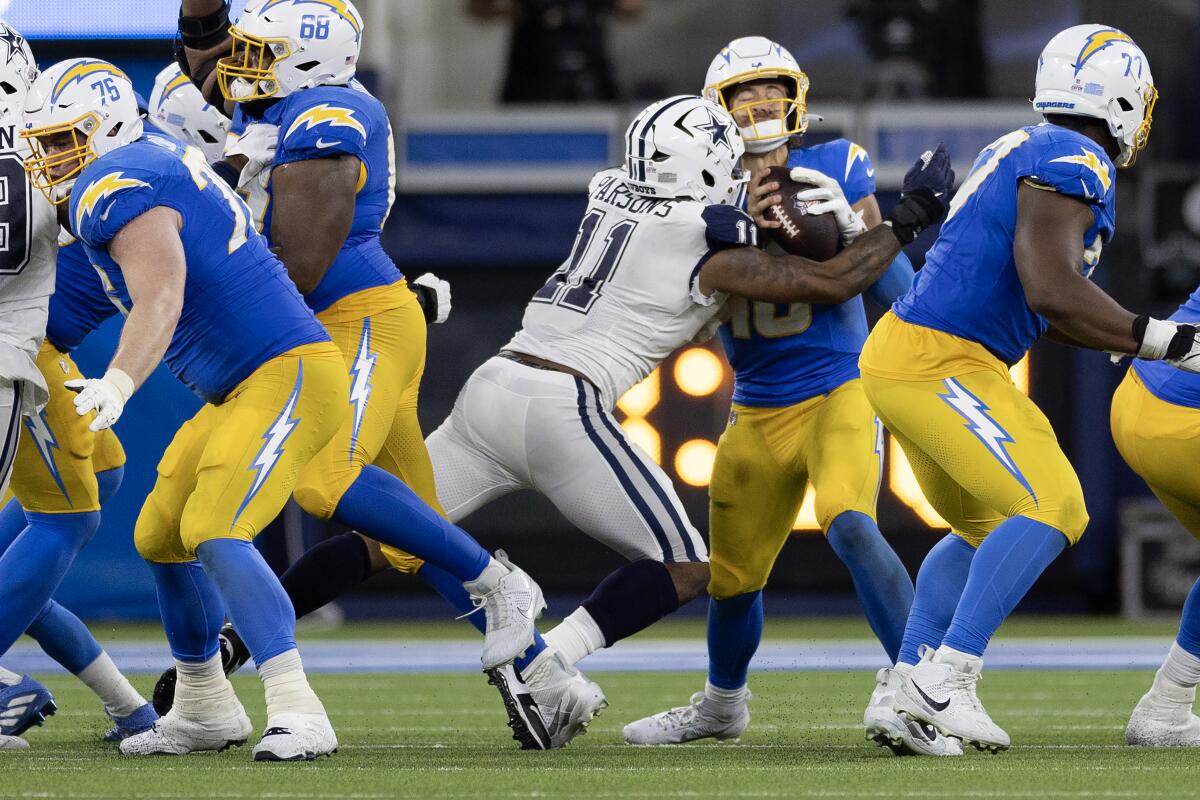
Herbert finished with 227 yards and two short touchdowns on 22-of-37 passing.
Chargers coach Brandon Staley blamed the unremarkable performance on his team’s inability to run the ball, which he said allowed the Cowboys’ pass rush to “really express itself.”
However, that particular defense of Herbert couldn’t be applied to the two particular throws that cost the Chargers points.
Late in the first half, with the Chargers behind 10-7, Herbert missed on a throw down the left sideline to Keenan Allen, who was open around the Cowboys’ 20.
The misfired throw cost the Chargers a field goal, maybe more.
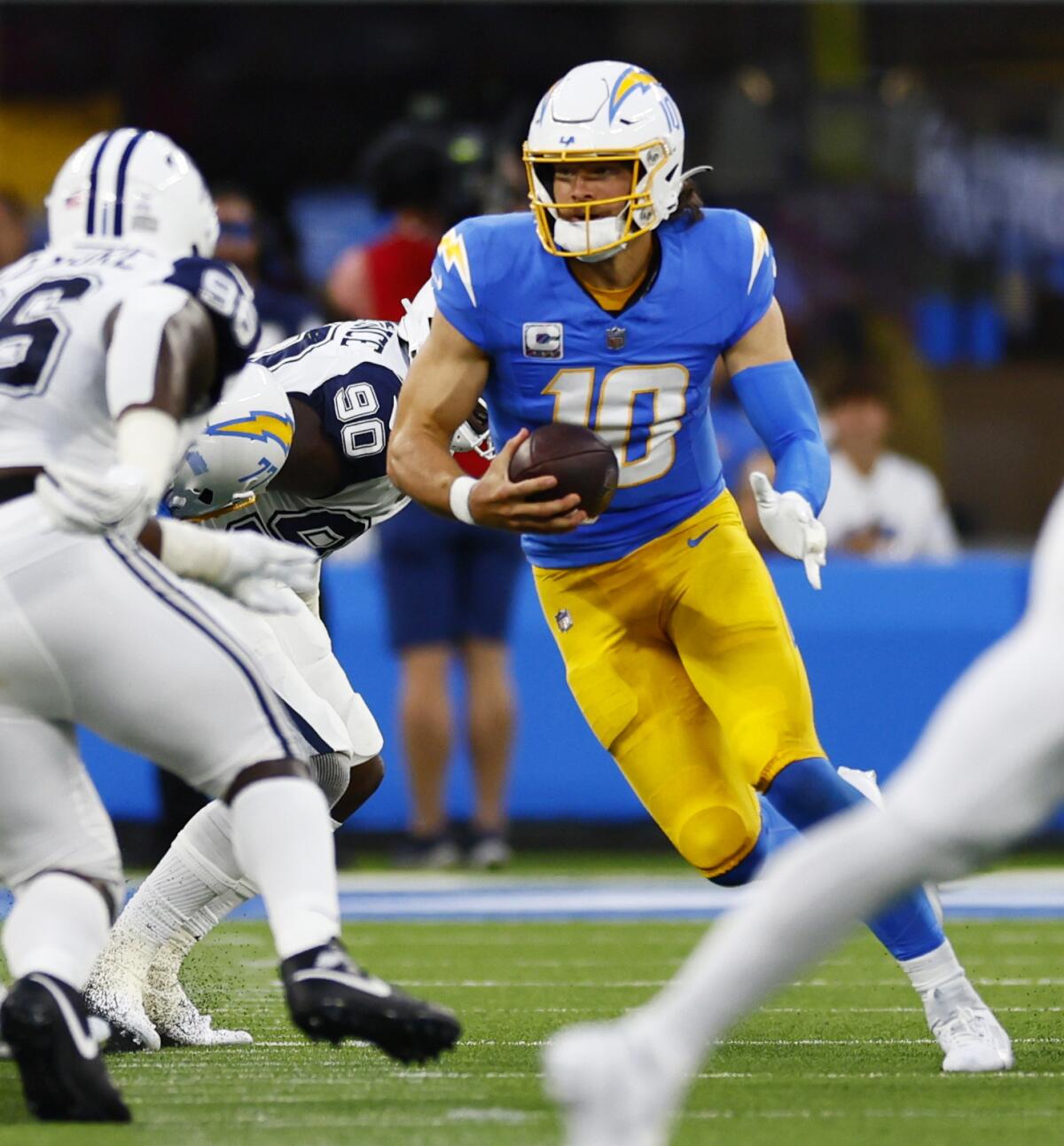
Early in the third quarter, with the Chargers down, 17-10, Herbert overthrew another pass down the left sideline to Allen, who was wide open after his double move made cornerback DaRon Bland stumble to the turf.
The inaccurate pass cost the Chargers a touchdown.
“That’s just part of ball,” Staley said.
Herbert knew better.
“Keenan ran two great routes and I missed him,” Herbert said. “That’s on me as a quarterback. We have those explosive opportunities and we have to capitalize on those.”
Did Herbert feel rushed?
“Even if I was,” he replied, “that’s on me to be able to calm my feet down, stay good in the pocket and hand deliver that strike.”
Especially with the Chargers rushing for just 53 yards. Especially with the Chargers continuing to give up big plays on third-and-long.
Breaking down the notable numbers behind the Chargers’ 20-17 loss to the Dallas Cowboys on Monday — scoring and statistics.
Herbert wasn’t responsible for blocking for Austin Ekeler, who was limited to 27 rushing yards. Herbert couldn’t be blamed for Michael Davis’ missed tackle on Tony Pollard that resulted in a 60-yard gain that set up a Cowboys touchdown. Herbert wasn’t at fault for the illegal contact penalty by Ja’Sir Taylor that bailed the Cowboys out of a third-and-18 and eventually led to the winning field goal.
But franchise quarterbacks are paid to be perfect when their teams aren’t. Herbert couldn’t play up to that level.
For what it’s worth, he tried.
He absorbed hit after hit. He ran the ball six times. He even caught his pass that was deflected and rumbled forward for a 10-yard gain.
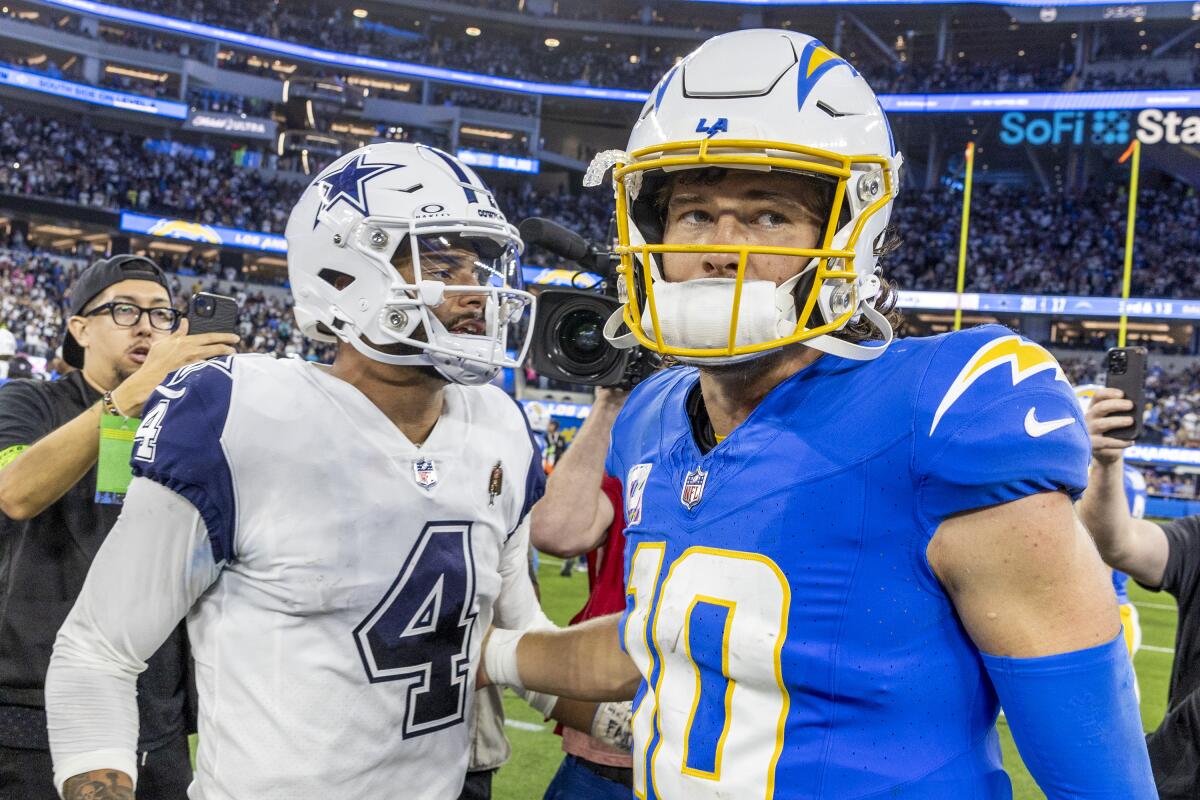
“He definitely gave us a chance to win the game,” Staley said. “He competed. We were right there at the end.”
Except the Chargers aren’t paying him to keep games close. They’re paying him to win them.
“We’ll watch the film and be critical on ourselves,” Herbert said. “We’ll learn from it.”
His accountability is appreciated, but at some point words are just words and potential is just potential. Four years into his career, he’s 27-27 as the Chargers’ starting quarterback. He has to be better.
He seemed to understand this.
As his teammates around him disrobed and walked to the showers, Herbert sat in front of his locker and stared at the ground. He was still in pads.
The game against the Chiefs was only six days away. He had to figure out something before then.
More to Read
Go beyond the scoreboard
Get the latest on L.A.'s teams in the daily Sports Report newsletter.
You may occasionally receive promotional content from the Los Angeles Times.

